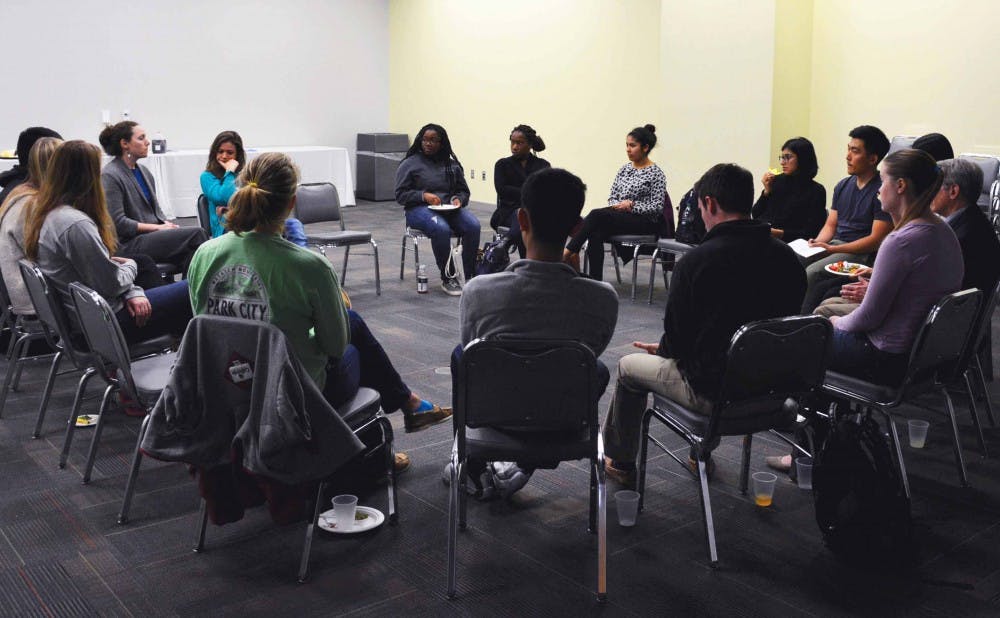Students and panelists convened Monday night to discuss personal experiences and ways to properly address the problem of racial profiling both in Durham and across the United States.
The discussion was part of Human Rights Awareness Week, sponsored by the Duke Human Rights Center. A mix of students and panelists provided input on their perceptions of how law enforcement treat people of color differently. The event focused on creating a space for participants to challenge each other, reach outside of their comfort zones and collectively understand racism better, both personally and systemically.
“Durham is an American city without a racial majority in the South, and over the last few years, we have been facing a lot of the same issues that are currently present across the country,” said Durham City Council member Steve Schewel, visiting assistant professor in the Sanford School of Public Policy. “There is documented racial profiling and disproportionate searches of cars, and we’ve been involved in a lot of conversations about how to fix these problems.”
Participants in the discussion talked about their different encounters with law enforcement and how the police made them feel, with the dialogue initially revolving around instances of racial tension in Ferguson, Mo. Since the shooting of black teenager Michael Brown by white police officer Darren Wilson in August, the town has become a hotbed of protest and discussion. According to the U.S. Department of Justice, 65 percent of Ferguson’s population is African American but accounted for around 85 percent of all traffic stops over the past two years.
Schewel noted that the problems in Ferguson are representative of the situation around the country—including here in Durham. He said human rights and civil liberties groups, as well as law enforcement groups, have submitted recommendations to the city council on how to change the scope of law enforcement. Disproportionate traffic stops and searches were among the main concerns of these groups seeking changes to the community’s legal system.
“What most people are not aware of is the Fourth Amendment right not to consent to searches,” Schewel said. “What [Durham] requires now is we need written consent to search a car. This makes the Fourth Amendment evident to everyone.”
Evidence of racial profiling in Durham has been documented in several reports in recent years—including a Southern Coalition for Social Justice report which found that although more than 80 percent of those searched by the Durham Police Department at traffic stops over the last five years were black, black individuals make up only 41 percent of Durham’s population. Black individuals in Durham are also approximately four times more likely than white individuals to be arrested on a misdemeanor marijuana possession charge, despite strong evidence that white and black people use the drug at roughly the same rate, according to the report.
Students shared different viewpoints on how they interacted with police officers, with some noting that their encounters with the police had not been out of the ordinary.
“I feel pretty typical and safer around police officers,” said Lauren, a participant in the dialogue, who declined to give her full name for safety reasons. “I’m not threatened, unless maybe if I’m speeding and generally passing by a cop is fine for me.”
Other participants, however, expressed distrust toward police officers based on how they had been treated in the past. Some participants relayed experiences in which they had been uncomfortable with law enforcement officials’ behavior, attributing the actions to their race.
One participant talked about being followed by police, while she and a friend were walking on the street. She noted that being differentiated because of her race made it difficult for her to feel safe around the police. Other students also pointed out that regardless of the law enforcement official’s race, they could not feel safe around the police because of how often they felt singled out.
Participants were conflicted over the level of activism in campus life. Although some felt Duke students as a whole were well-informed, others believed that a majority of students were not very aware of racial profiling issues.
Some cited the presence of racially-insensitive comments on social media, especially the anonymous mobile application Yik Yak, as evidence that there are students uninterested in or denying racial bias problems.
“Yik Yak talks a lot about race relations,” said Kevin, a participant in the dialogue who similarly declined to give his full name. “As a social media outlet, it captures a wide spectrum of opinions on campus.”
Participants noted that these differences in perspective highlighted a lack of awareness on campus with regards to racial problems. Students noted, however, this could be viewed as call for students to bring more opinions into the dialogue on racial issues.
Get The Chronicle straight to your inbox
Signup for our weekly newsletter. Cancel at any time.

